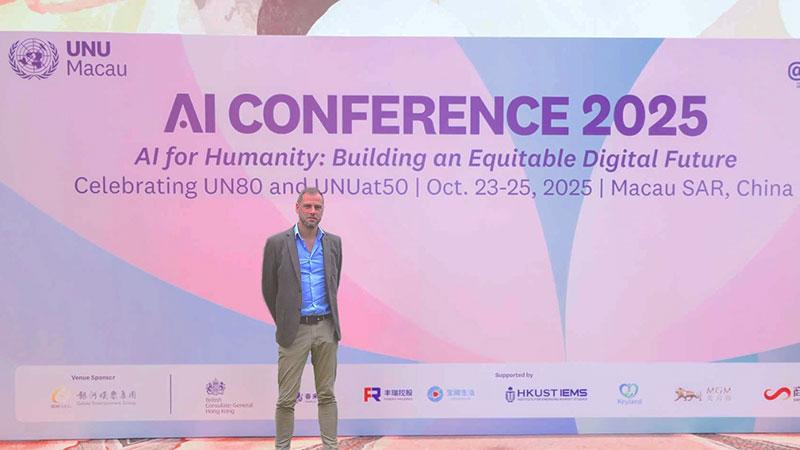Dr Doug Specht, Head of the School of Media Communication at the University of Westminster, joined experts from around the world to discuss how artificial intelligence (AI) can reshape higher education and help build fairer and more resilient communities at the United Nations University Institute Macau (UNU Macau) conference.

Speaking at the conference titled AI-Driven Transformation Opportunities in Higher Education, Dr Specht urged educators and policymakers to ensure that AI technology benefits everyone, not just those in wealthy or well-connected parts of the world.
During the panel discussion, Dr Specht emphasised three key points. The first was that AI must close gaps, not widen them. He warned that without care, AI systems could deepen inequalities, especially in countries with limited access to digital technology. Secondly, he explained that local knowledge matters, highlighting that AI tools should support not replace the insights of local communities and educators. Finally, he urged that universities are key players and can act as bridges between technology, policy and the public, ensuring that AI projects are fair, transparent and accountable.
In the course of the session, panellists examined pilot cases in Sub-Saharan Africa, South Asia and Latin America where AI tools have been used to map climate risks such as floods, improve infrastructure planning and support teaching in areas affected by climate change.
The UNU Macau is a global think tank dedicated to research, training and education on digital technologies for sustainable development. It promotes evidence-based actions and policies to support the achievement of the UN’s Sustainable Development Goals (SDGs). The UNU Macau works collaboratively to explore how digital technologies can be used for sustainable development, addressing key issues expressed in the UN 2030 Agenda for Sustainable Development.
Dr Specht leads research on how technology and data shape society and has helped shape conversations around how universities can adapt to the age of AI. Through public talks, written pieces and workshops, he encourages students and colleagues to use AI tools thoughtfully, from improving research to developing new ways of learning.
Dr Specht said: “Artificial intelligence presents one of the most significant challenges, and opportunities, for higher education today. Navigating its ethical, pedagogical and societal impacts requires a coordinated global response. That’s why it is great that we are able to actively collaborate with the United Nations, ensuring that our educational strategies and policies align with international standards and address the complexities of AI in a rapidly changing world.”
Dr Specht’s contribution to the conference and work within AI and education contributes to the United Nations Sustainable Development Goals (SDG) 4: Quality Education, 16: Peace, Justice and Strong Institutions and 17: Partnerships for the Goals. Since 2019, the University of Westminster has used the SDGs holistically to frame strategic decisions to help students and colleagues fulfil their potential and contribute to a more sustainable, equitable and healthier society.
Find out more about Media and Communication courses at the University of Westminster.


